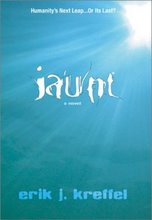
The novel’s premise reads something like the back-story of an arcade game. Two hundred years in the future, mysterious alien jewels are found in a crater in the Himalayas. The jewels possess the ability to travel in time, and a top science institute for the coalition of Western nations must race through time and space to collect the rest of the jewels before the Russians can use them to build a super-weapon and take over history itself.
Despite the odd Cold War throwback feel, the first chapters show potential to become a fun story. Unfortunately, the majority of the book is by turns overly simple and frustratingly confusing. It’s never clear why everyone thinks the Russians can make a weapon out of the jewels. And why would a group of scientists so advanced that they can whip up time machines in a matter of days be unable to come up with anything more viable than pickaxes when excavation work is required? These kinds of inconsistencies make it difficult for a reader to stay caught up in the action or suspend their disbelief to the degree required by the plot.
Another thing that makes the novel hard to relate to is the lack of a focal character. The back-cover summary identifies Agent James Gilmour as the novel’s main character, but this isn’t borne out in the text. In a cast of characters that are sketchily drawn at best, Gilmour is, if anything, even less of a force than the rest. Other characters witness key events, make the necessary technological leaps, and plan the “jaunts” through time and space. Gilmour just follows orders, generally with far less competence and initiative than one would expect of the man chosen by his government to prevent the destruction of the “World Order.” He doesn’t have a back-story, motivation, a love interest, or even any personality to speak of that would mark him as a main character.
Beyond character and plot development concerns, the language that Jaunt is written in is a major issue. The sentences range from the grammatically mangled (“Without missing a step, Gilmour’s left gauntlet laid a powerful uppercut to the trailing man, a sickening crack gurgling from the man’s crushed throat.”), to the humorously misphrased (“Valagua, packed with several briefcases and a rucksack, stepped out next…”), to the downright obtuse (“De Lis’ skin wore a dark pallor, much like a man held prisoner.”)
The result is that Jaunt is extremely labor-intensive to read. The reader’s brain has to work overtime for each sentence, looking at the words, extracting the key points, and then reorganizing the sentence so that it presents a coherent point.
With some good development, and intensive line editing, Jaunt could become an interesting, pleasant read. As it stands, however, the novel simply isn’t ready to be on the market.
Jaunt blog: http://www.jauntworld.blogspot.com/
Smashwords ebook: https://www.smashwords.com/books/view/1921
Get an Editorial Review | Get Amazon Sales & Reviews | Get Edited | Get Beta Readers | Enter the SPR Book Awards | Other Marketing Services






















Leave A Comment